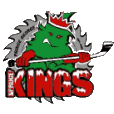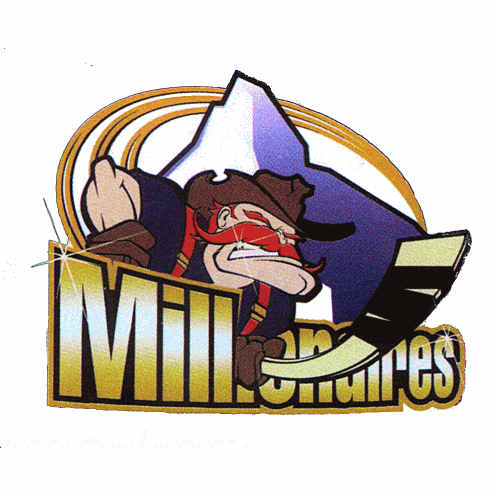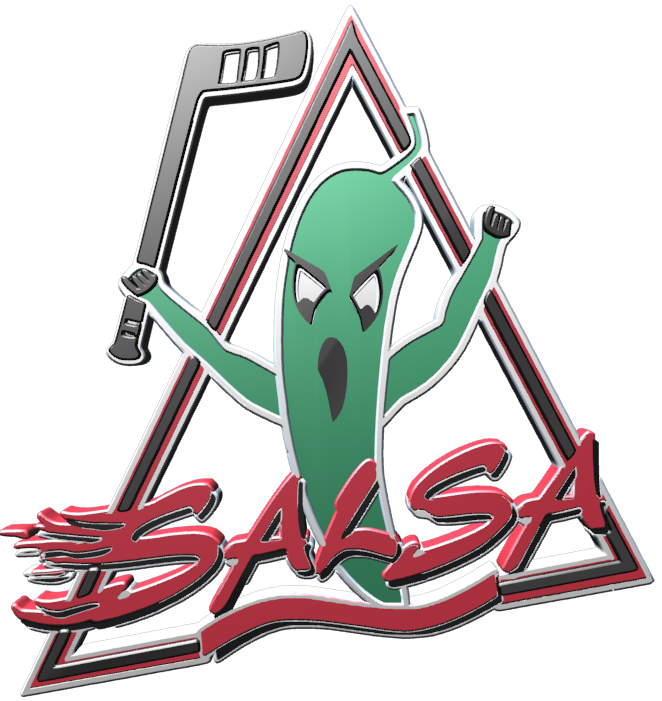THE LEAGUE HISTORY
PRE-LEAGUE - JUNIOR 'B' TO JUNIOR 'A'
PRE-LEAGUE 1960 & 1961
Introduction
Today, there are two junior A leagues in British Columbia the KIJHL (Kootenay Internation Junior Hockey League) and the PCHL (Pacific Coast Hockey League). However, although an independent league, operating outside of Hockey Canada's jursidiction, the BCHL (British Columbia Hockey League) is considered by many as British Columbias' top echelon junior A league. But, lets look at how it all started and some of it's history that unfolded.
1960 - Rekindled Interest In Junior Hockey
Interest in Junior 'A' surfaced in BC, for real, in September of 1960, at the annual meeting of the BCAHA. It was decided by the BCAHA(British Columbia Amateur Hockey Association), with the approval of the CAHA(Canadian Amateur Hockey Association), that BC would enter a Junior 'B' team, for the first time, in Canadian junior hockey competition for the Memorial Cup. (source)
The idea was to establish junior leagues in BC, then each league would provide an All-Star team to play for a Provincial championship. The winner of BC would be declared Junior 'A' for competition in the Memorial Cup playdowns. It was also agreed that the winning team be strengthened, with up to six players from any other BC Junior 'B' teams. (source)
With that BCAHA decision the Okanagan Valley would recieve it's first Junior 'B' hockey in three years. By December of 1960 a Junior 'B' league had been organized with four clubs Kelowna, Penticton, Vernon and Kamloops which would consist of strictly local players. The league would play a 12 game schedule, six home and six away, ending February 1. After the playoffs the league would pick an all-star team for the Memorial Cup. (source) / (source 2)
JUNIOR "A" HOCKEY MAKES ITS DEBUT
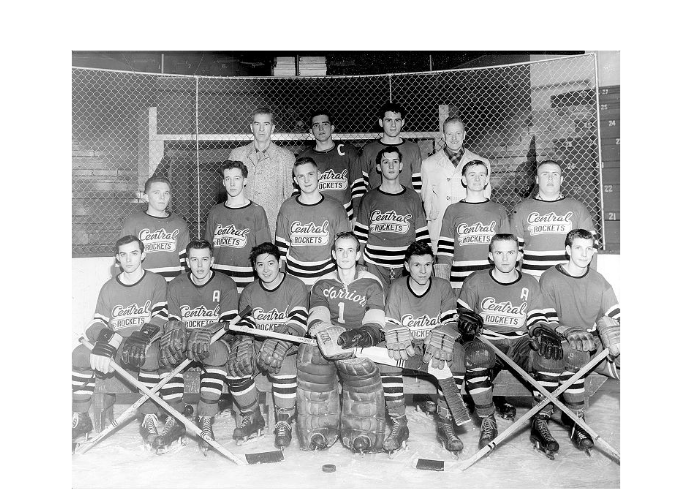
The junior 'B' league opened on Feburary 3 with a game in Penticton where the hometown Selects defeated the Vernon Junior canadians, 5-2, in front of nearly 200 fans. (source)
On December 15th, 1960 the Vernon News reported... "Vernon Minor Hockey Association President Bill Brown has been named coordinator of an Okanagan-Mainline All Star squad to contest the Provincial junior 'A' playdowns with an eye to the Dominion Memorial Cup next spring. At the meeting in Kelowna, Monday, representatives from the four major Okanagan-Mainline cities decided to form a junior league which will kick off in Penticton Friday night with Vernon the visitor..." (source) / (source 2)
Okanagan Junior "A" All Stars Central Rockets Hockey Team
Back row left to right: Kenny Stewart (coach
Kamloops), Dave Kowal (Vernon), Brian Sammartino
(Vernon), Bill Brown (manager Vernon).
Centre row left to right: Elmer Arrance
(Kelowna), Warren Henry (Vernon), Harry Wynnychuk
(Vernon), Don Schollen (Kamloops), Larry Stiles
(Penticton), Larry O'Connell (Penticton).
Front row left to right: Barry Hunt (Kamloops),
Bill Donaldson (Kamloops), Vic Minamede
(Kamloops), George Beck (Vernon), Don McColl
(Vernon), Ralph Boychuk (Kelowna), Bill Allercott
(Penticton).
(source)
While the All Star team wasn't successful in securing the Dominion Cup, losing to Trail/Rossland 7-0 and 7-4 in semi-final action, they did lay the foundations for the formation of a junior 'A' league. (source)
LEAGUE YEARS - 1960's
LEAGUE YEARS - 1960's
1961 - Junior 'A' In the Okanagan
Before the 1960's there were Junior "A" Hockey Leagues all over Canada, however, no Junior "A" Hockey League within the province of British Columbia.
With juvenile hockey in the Valley on the decline, plans for a junior A league in the Okanagan Valley were officially drawn-up at a meeting in the Allison Hotel on Sunday, May 16, 1961. (source)
First Executive & Appointments
On Sunday, May 28, 1961 the executive for the Okanagan-Mainline Junior "A" Hockey League was elected. (source)
- President
- Bill Brown, Vernon
- Vice-president
- Bob Taylor, Kelowna
- Directors
- Larry Buchan and Carl Sorensen, Vernon
- Don White and Bob Taylor, Kelowna
- Jack Mertz and Elmer Marchant, Penticton
- Bud Fraser and Doug Dawe, Kamloops
- League Secretary Leonard Miller, Vernon (source)
- League Statistician Pete Munoz (source)
- Referee-in-Chief: Bob Taylor (source) / (source 2)
Pre-season decisions
- 30 Game Season Schedule, 15 Home & 15 Away (source) / (source 2)
- Davies Cup League Championship Trophy (source)
- Professional Teams Sponsorship (source) / (source 2)
The BCAHA gave financial support to the Memorial Cup BC playdowns. (source)

1961-62 Season
NOTE: The Okanagan Junior Hockey League did not have an official logo in this era of the 1960's. All the teams, including any media, just used the words "Okanagan-Mainline Junior A Hockey League", "Okanagan- Mainline Junior Hockey League", "Okanagan Junior Hockey League", "Okanagan-Mainline Junior Hockey Association" and "Okanagan Valley Junior Hockey League" in various fonts and forms of the times.
On September 18, 1961 the Kamloops Daily Sentinel reported..."The junior loop, organized last year by several prominent Valley sportsmen and headed by Vernon's Bill Brown will kick off the 1961-62 season Oct 31."
The Vernon News released a OMJAHL 1961-62 schedule on September 21, 1961, in the same article reported... "Next step is an orgraizational meeting slated for the Allison Hotel Monday night a 8:00 p.m. Main item on the agenda will be the distribution and sale of season tickets. These can be had now from minor hockey officials, or at Ernie's Esso Station, Lumby Hotel and Allison Hotel. The attratice price of $5.25 is good for 15 games." (source)
First League Game
- Played October 31, 1961
- Won by Kelowna, score, 5-4ot
- (source)
First League Goal
- Scored by Bob Gruber (Kelowna)
- (source)
The leagues' playoff champions would be presented the Davies Cup, donated by Ernie Davies owner & manager of the Central Hotel in Kamloops. The league was also sanctioned by the BCAHA and CAHA for the Memorial Cup playdowns. (source)
The league also presented its' first awards Presidents Trophy for MVP to Buck Crawford. The trophy for league scoring champion went to Jackie James. (source)

1962-63 Season
Second Executive
On Sunday, April 15, 1962 the executive for the Okanagan-Mainline Junior "A" Hockey League was elected at the Annual General Meeting. (source) / (source)
- President
- Don White, Kelowna
- Past-President
- Bill Brown, Vernon
- Vice-President
- Mike Shabaga, Kamloops
- Secretary-Treasurer
- Len Miller, Vernon
1963-64 Season
Third Executive
On May 2, 1963 the Vernon News reported "The meeting Monday saw a switch of executive heads with Len Miller of Vernon suceeding Donald White of Kamloops as president of the junior hockey loop. Bill Schall of Kamloops was named first vice-president and Blair Peters of Kelowna, last season's referee-in-chief, second vice-president." (source)
The Penticton Vee were forced to withdraw for the 1963-64 season. The Vernon News reported on July 29, 1963 "At a special meeting held in Penticton Thursday the OJHL executive was told by Penticton hockey officials that the Vees' re-entry into the league was impossible at this time."
"Penticton officals blamed a shortage of players, poor spectator support and a $500 debt for forcing the Vees out of the OJHL picture. The club folded in early June after repeated and futile attempts to drum up local support."
1964-65 Season
Kamloops and Kelowna dominated the first five years of the new Okanagan Junior Hockey League, occupying the first two places in the standings, and meeting in the championship final every season. Also, during that time the Vernon franchise changed its nick-name to the Blades in 1963. It wasn't until the Penticton Broncos, who entered the league in 1964 following the demise of the Penticton Jr. Vees, that a different champion was born as they up-ended the Kelowna Buckaroos, in a six game final, to win the 1967 title and put an end to the Kamloops Kraft Kings/Kelowna Buckaroos dynasty.
At the time, each team was required to fill all but five roster positions with 'home-grown' talent, products of their respective city's minor hockey systems.
Tom Williamson was a member of the Blades and the Essos and got the opportunity to play for his hometown team in Vernon from 1966 to 1968. He remembers a league that was bursting with a sense of community, even though the players at the time had to be tough as nails.
"My first year, I was 10th in scoring, but I also was 10th in penalties, so if you add the two, I was the leading scorer," Williamson said with a chuckle. "There were no helmets, so the attitude was, don't pretend to be tough unless you are."
"It was a community then. The other cities were the same too. One of the reasons why we attracted a lot of fans in those days is we were all Vernon kids. We all played minor hockey together. There was that sense of community there."
As is pretty much the case by even today's standards, there wasn't much money to be made minimizing their losses over a 30-game schedule was the owners' greatest financial concern.

In 1967 BCAHA announced that a, seven team super Junior 'A' league was to be formed in BC, which, was proposed at it's March 11 meeting. (source)
As, there was three junior 'A' leagues operating in BC at the time, on the Coast(Pacific Coast JHL), in the Kootenays(West Kootenay JHL) and in the Okanagan(Okanagan JHL), applications to join the new league were to be recieved in Penticton on or before, April 22, 1967, twelve applictions were handed in. (source)
The British Columbia Junior Hockey League was eventually made up of two teams of the Pacific Coast Junior Hockey League, New Westminster Royals and Victoria Cougars and the four teams of the Okanagan Junior Hockey League Kamloops Kraft Kings, Kelowna Buckaroos Penticton Broncos and the Vernon Essos. The BCJHL also adopted a official logo at his time.
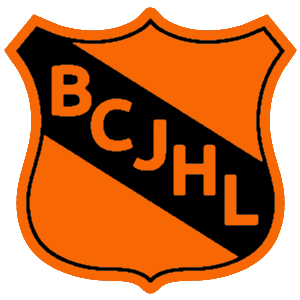
The new British Columbia Junior Hockey League was 'Officially' sanctioned on Sunday, June 23, 1967 with the following announcement in local newspapers... (source)
June 24, 1967 - Nanaimo Daily News: "A six-team British Columbia Junior A Hockey League was formed Sunday including teams from New Westminster, Victoria, Kelowna, Kamloops, Penticton, and Vernon. In making the announcement, Ivan Temple, secretary-treasurer of the B.C. Amateur Hockey Association, said there were eight applications for franchises but Trail and Vancouver were turned down. ... Penticton, Kelowna, Kamloops, and Vernon played in the Okanagan Junior Hockey League while New Westminster participated in the Pacific Coast Junior Hockey League."(Newspaper excerpt submitted by Raplh Slate of HockeyDB)
With new owners came a name change for the Vernon franchise in 1967. Now nicknamed the Essos, co-owner Vern Dye recalls mere existence. "In our first year (1967/1968), our budget was $15,000.00. We traveled by car to road games, and we did pay the players a bit. They got $20.00 to $40.00 a month, and room and board. Back then, skates cost $50.00, sticks were $1.10."
In 1969 the Vancouver Centennials entered the BCJHL. One year later, in 1970, the Chilliwack Bruins joined the fold, and league governors opted for a two-division set-up. The four newest clubs , New Westminster Royals, Victoria Cougars, Vancouver Centennials, Chilliwack Bruins, were put in the Coastal Division, and the original Okanagan franchises, Kamloops Rockets, Penticton Broncos, Vernon Essos, Kelowna Buckaroos, comprising the Interior Division. With the league having doubled in size, from 1961 to 1970, so did the schedule, from 30 to 60 games.
Looking Back
Three of the founding four teams are still alive today. Although there was the brief hiatus and several name changes, the Penticton Junior Vees live on today and are back under the Vees name. The Vernon Junior Canadians experienced the same thing with a brief hiatus in the 1970s and several name changes, but are currently known as the Vernon Vipers.
You may think the Kamloops Junior Rockets are defunct, but that is not the case. After a brief move to White Rock in the 1973-74 season, the team packed up and headed to Merritt where they have been known as the Centennials ever since. They are the longest continuously-run franchise in the BCHL.
The Kelowna Buckaroos weren't so lucky. After winning the 1965 and 1974 league championships, they moved to Summerland in 1983 and eventually folded in 1988 after a 27- year run. BCJHL hockey came back to Kelowna shortly after the Buckaroos left and now days they are able to cheer for the West Kelowna Warriors franchise.
February 1966, Eric Shishido playing for the Kamloops Kraft Kings becomes the first and only player in league history to win the BCHL scoring championship twice. He won the title in both '65 and '66 and finished second in 1964.
January 28 1968, Kamloops' Grant Evans scores 7 goals in one game, all 7 of his team's goals, in a 9 - 7 loss to host New Westminster - a BCHL record.
March 2, 1968, Vernon's Tom Serviss becomes the first and only defenceman to win the BCHL scoring championship.
October 1968, The beginning of this NHL season sees a first for a former BCHL player. Jim Harrison, who scored 19 points as a 16 year old with the Kamloops Rockets in 1963/64, is the first from the BCHL to play in the NHL playing his first of 67 games this season with the Boston Bruins. Harrison went on to an impressive NHL and WHA career.
When he reflects on the BCHL's 60 years, Tom Williamson( says the league's longevity and ability to withstand adversity in those early days is what is most impressive.
"What stands out the most is the fact that [the league] has sustained itself over time," he said. "I know Penticton had to drop out at one point and Vernon suspended operations for a period as well. Different owners came along and really made it roll."
Source Material: 60th Anniversary Series PDF | SmartHockey 50th Anniversary Edition PDF
LEAGUE YEARS 1970'S
LEAGUE YEARS 1970'S
The 1970's

The 1970's, the British Columbia Junior Hockey League's second decade of existence, began on a bad note, with the loss of two teams, the Victoria Cougars and New Westminster Royals(both went WHL) but, finished with league membership at an all-time high of thirteen clubs. In between, thirteen clubs received expansion franchises, six relocated and another seven ceased operations as the league struggled in some communities but, thrived in others.
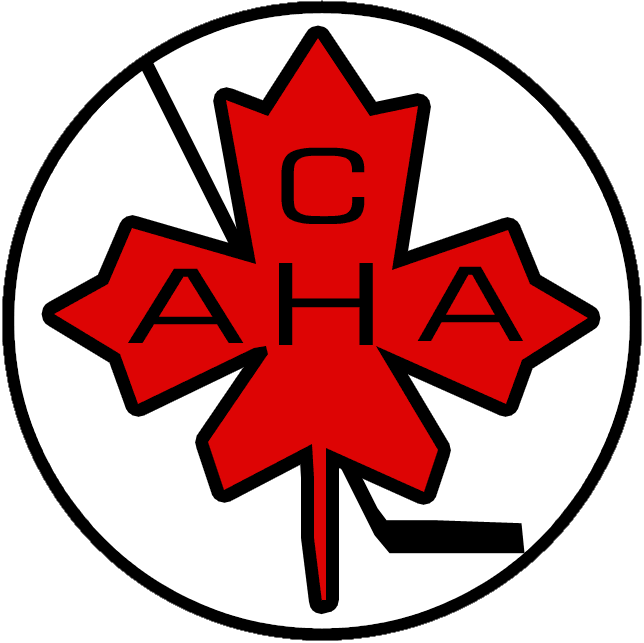
Also, following the designation of Major Junior and Junior "A" Hockey, by the CAHA, the Junior "A" clubs were no longer eligible to compete for the Memorial Cup. Hence, a new trophy, The Manitoba Centennial Trophy was presented to the Canadian Amateur Hockey Association (CAHA) by the Manitoba Amateur Hockey Association to commemorate their centennial year of 1970. The Centennial Cup, as it was known was presented to Canada's Junior "A" National Champion for the 1971 Championship.
Expansion Boom
In 1970, the league welcomed the Chilliwack Bruins, then the Bellingham Blazers and Nanaimo Clippers in 1972. The year after, it was the Langley Lords turn to join the club. The second half of the decade saw even more teams enter the fray, including the Kamloops Braves (after the Rockets moved), Abbotsford Flyers, Chilliwack Colts (after the Bruins left), Delta Suns, Richmond Sockeyes and Nor-Wes Caps.
Vernon was the only founding four team without a league championship in the 1960s, but they remedied that when the Essos brought the league championship home in 1970 and 1972. Kamloops, Penticton and Kelowna each won one apiece.
With the creation of Major Junior and Junior "A" Divisions of competition, the Victoria Cougars jumped ship from the BCJHL to join the Western Hockey League as a Major Junior franchise. Meantime, the New Westminster Royals were forced out of their home by the Estevan Bruins of the WCHL, leaving the BCJHL with just six teams for the 1971/1972 season causing an elimination of Divisions with-in the league.
However, the league rebounded for the 1972-73 season, adding the Bellingham Blazers and Nanaimo Clippers, re-establishing the Divisional system and never operating with fewer than eight teams ever again. It was also, the end of the Vancouver Villas as they folded after the '73 playoffs.
The Kamloops Rockets moved to White Rock and became the Centennials in 1973 and less than a year later, they moved again to Merritt where they remain today.
The Langley Lords were the cinderella team of the 1973-74 season, thier inaugural year. Not only did they end up tied for second, along with the Penticton Broncos with 78 points, they also had a long playoff run. The Lords, having previously defeated the Nanaimo Clippers and Bellingham Blazers, were finally stopped by the Kelowna Buckaroos who then claimed the Nat Bailey Cup.
In 1975, the first out-of-province team, the Bellingham Blazers won their first. They also, defeated the Coquitlam Comets of the Pac 'A' league for the provincial Mowat Cup. As the rebranded Ice Hawks they won again in 1979.
In 1975 the first BCJHL player was selected by a team in the NHL Entry Draft. In 1974-75, Merritt Centennials forward Greg Agar put up 90 points in 52 regular-season games which undoubtedly caught the eye of scouts at the highest level. At the 1975 NHL draft in Montreal, Que., Agar was taken in the 10th round by the California Golden Seals to become the first player selected from the BCJHL.
The Vernon, B.C. native would never end up playing any NHL games, but he was the first in what became a long line of players from the league hearing their names called at the draft. Prior to that, it was common for young players to get their start in the BCJHL, then move on to the Western Canadian Hockey League (now known as the WHL) where they would eventually get drafted, but Agar was the first to be taken straight out of the BCJHL, which is common practice now days.
Agar played one more year in Merritt, before embarking on a minor-league career.
Other notable players who came through the league in the decade went on to have productive and successful careers in the NHL.
Glenn Anderson, who won six Stanley Cups in his career and totaled 1,099 points, got his start with the Bellingham Blazers in 1977-78. He is one of only three former BCHL players to top 1,000 points in the NHL.
Other players like John Ogrodnick (Maple Ridge Bruins), Mel Bridgman (Nanaimo Clippers), Stan Smyl (Bellingham), Barry Pederson (Nanaimo) and Ryan Walter (Langley Lords) all came through the BCJHL in the 1970s and went on to collect over 600 NHL points.
Vernon Essos forward Ed Johnstone was another notble player. He played for Vernon for two years from 1970 to 1972 and eventually embarked on a 12-year NHL career with the New York Rangers and Detroit Red Wings.
He echoed the sentiments of many who played at the time. Back then, junior hockey was a much different game than it is now.
"There wasn't nearly as much scoring as there is today, but it was a good league," said Johnstone. "I think it was a little tougher. You had to take the body. I think there was way less stick work than there is today. If you did wield your stick around, you had to stand up for yourself. You learned how to play the game and you learned how to take a check and give a check. The number-one thing was that you learned how to protect yourself. You were a fair player. You just played the game hard."
The Nanaimo Clippers won three straight BCJHL crowns in 1976, 1977 and 1978, but only challenged once for the Centennial Cup, in 1977, when they were swept in a best-of-five Provincial Championship Series by the Richmond Sockeyes of the upstart P.A.C. (Pacific) "A" Hockey League.
A year earlier, 1976, the BCJHL chose not to enter the National Playdowns, conceding the Provincial Championship, the Mowat Cup, to the PAC "A" (Pacific Junior Hockey League) Champions, the Nor Wes Caps. The Caps then chose not to compete in the BC vs AB regional series and the second place Richmond Soceyes of the PAC"A"HL were chosen by the BCAHA to enter the National Playdowns.
The wildest possible finish to the BCJHL season occurred during the 1977-78 season, a year in which there were two Champions but no Championship Series. Opting to return to the Centennial Cup Playoffs, the BCJHL sent the Regular Season Champion Merritt Centennials into Inter-Provincial play. Merritt swept Richmond to win the Provincial Title, and then defeated the Calgary Cowboys, before falling to the eventual Centennial Cup Champion Prince Albert Raiders in the Abbott Cup (Western Canada) Final. Meanwhile, the rest of the BCJHL carried on its post-season without Merritt.
Coastal Division Champion Nanaimo Clippers met the Interior Champions Penticton Vees in the BCJHL, Final. However, the series ended after only three games when the Vees refused to continue, citing Nanaimo's rough play. The Clippers were awarded their third straight Championship, but according to former Nanaimo coach Larry McNabb, his team could have gained more. "It was a disaster," recalled McNabb. "We split two games in Penticton, and then we had a brawl in game three. Penticton's coach pulled his team off the ice, but they started it. We were declared the winner, but the problem was, I was getting 2,000 fans a game. We won a Championship, but lost money. We got robbed!"
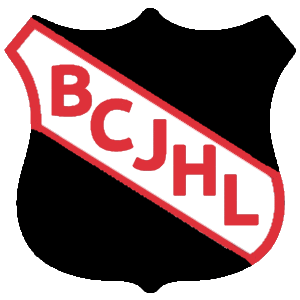
Playoff revenue was how many teams balanced the budget in the 1970's. Budgets were in the neighborhood of $70,000.00 a year, with coaches pulling in a few hundred dollars a month.
The BCJHL's second decade ended with the demise of the PAC. "A" League as former members Coquitlam Comets, Nor Wes Caps, Richmond Sockeyes and Vancouver Blue Hawks joined the senior circuit over a two-year span.
With the granting of an expansion franchise to the Cowichan Valley Capitals, the league's presence on Vancouver Island had doubled. While stability was lacking and franchise shuffling became an annual event, now at 13 teams, the BCJHL offered the province's young players two choices, a route to Major Junior or College Hockey.
Looking Back
February 13 1971, The first BCHL All-Star Game is played in Vancouver with the All-Stars defeating the Vancouver Centennials, 6-5.
October 29, 1977, Ken Stroud sets a BCHL record for points in one game with 3 goals and 9 assists as his Merritt Centennials destroy Revelstoke 20 - 3. Stroud's record, which still stands.
Source Material: 60th Anniversary Series PDF | SmartHockey 50th Anniversary Edition PDF
LEAGUE YEARS 1980'S
LEAGUE YEARS 1980'S
The 1980's
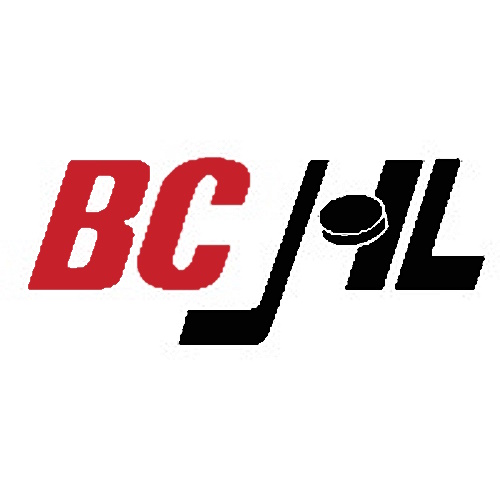
In the 1980's, with a re-designed new logo, the British Columbia Junior Hockey League continued, what the previous decade started, with expansion, contraction and team relocation. The 1980's saw ten teams enter the league, eleven leave and seven relocate. As well in the 1980's the league increased the the regular season games, added and deleted divisions and changed the playoff format many times.
The League also emerged at the regional and national levels in the 1980's. The League won ten provincial titles, Mowat Cups, six British Columbia versus Alberta titles, Doyle Cups, five Western Canadian titles, Abbott Cups and five National Championship appearances, Centennial Cup, which includes two Centennial Cup semi-finalists and two Centennial Cups.
The Leagues first and second Centennial Cups (National Championship) were won in 1986 & 1987 by the Penticton Knights and Richmond Sockeyes respectfully.
The 1980s saw the B.C. Junior Hockey League shed its image as the "weak sister" of Canadian Junior "A" Hockey after having advanced to the second round of Inter-Provincial play just three times in 12 years since the creation of the Centennial Cup. BCJHL teams went on to four Centennial Cup appearances over a five-year span, and won two National Championships. The Abbotsford Flyers broke the jinx in 1982/1983, knocking off the Calgary Canucks and Dauphin Flyers to become the first B.C. team to reach a National Championship Series. They fell in consecutive games to Ontario's North York Rangers, but not before setting the trend of great things to come for the BCJHL. Two years later, the Penticton Knights advanced to the Centennial Cup final, only to lose the last game of the four-team tournament to Orillia Travelways of Ontario. However, a year later, Penticton gained a measure of revenge by going 3-1 in Round Robin play before defeating the host Cole Harbour Colts 7-4 in Nova Scotia to bring the Centennial Cup back to B.C. for the first time. The surge continued with the Richmond Sockeyes capturing B.C.'s second consecutive Centennial Cup Title in 1987.
Superstars in the Making
But it was during the 1980s when the true superstars started to filter through the BCJHL and burst onto the scene in the pros. The prime example is Brett Hull. Fresh off his 18th birthday and a season playing Juvenile hockey in the Vancouver area, Hull joined the Penticton Knights for the 1982-83 season and the rest was history. He scored 48 goals in 50 games his rookie season and finished sixth in league scoring with 104 points. His second season in Penticton was even more impressive as he set the single-season record for goals with 105 in just 56 games, a mark that still stands today. He also set the record for points in a single season with 188, another record that has yet to be broken. His scoring prowess was so notorious that the league eventually named its top scorer trophy after him.
Hull was surprisingly passed over in the NHL Draft after his rookie campaign with the Knights, but his record-breaking second year sealed the deal and he was selected in the sixth round of the 1984 draft by the Calgary Flames. Hull would go on to play two years at the University of Minnesota-Duluth and was a finalist for the Hobey Baker Award his second year after recording 84 points in 42 games. Once he reached the NHL, he turned into one of the best and purest goal scorers the league has ever seen. Hull led the NHL in goals on three different occasions, including the 1990-91 season where he scored 86 times, which was the third most in NHL history. He also won the Hart Trophy as the league's Most Valuable Player that season.
Hull won the Stanley Cup twice in his career, once with the Dallas Stars in 1999 where he scored the overtime finals clinching goal, and once more late in his career with the Deroit Red Wings. He was inducted into the Hockey Hall of Fame in 2009.
Not to be outdone, another eventual Hockey Hall of Famer came through the BCJHL in the '80s and that was former Langley Eagle Mark Recchi. The Kamloops, B.C. native played his 16-year-old season in Langley where he put up 65 points in 51 games before jumping to the Western Hockey League and eventually being selected by the Pittsburgh Penguins in the 1988 NHL Entry Draft. Recchi played in the NHL for for 23 years, won three Stanley Cups and racked up 1,533 points, the most by any BCHL alumni.
Not quite superstars, but big-time offensive producers in their own right, players like Ray Ferraro (Penticton Knights, 1981-82), Cliff Ronning (New Westminster Royals, 1982-83), Geoff Courtnall (Cowichan Valley Capitals, 1980-81) and Joe Murphy (Penticton Knights, 1984-85) all spent time in the BCJHL during the decade and ended up having lengthy NHL careers.
Every year from 1980 to 1989, there was at least one BCJHL player drafted by an NHL team. The most significant pick was Brett Hull to Calgary in 1984 for all the reasons above, but the highest pick was also a milestone for the league. In 1989, Jason Marshall of the Vernon Lakers was the first-ever first-round pick to come out of the BCJHL when he was selected ninth overall by the St. Louis Blues. Marshall was coming off a season where he had 40 points in 48 games for Vernon, but also had 197 penalty minutes, which was likely another enticing factor given the style of play at the time.
The 1982 NHL Draft featured eight selections out of the BCJHL, which stood as the high-water mark until 2003. The most significant player out of that year's group was Ray Ferraro, chosen in the fifth round by the Hartford Whalers after notching 135 points in 48 games for the Penticton Knights during the '81-82 campaign.
Dynasties Born and National Recognition
The Penticton Knights dominated the 1980s, winning the league championship five out of 10 years, including three straight to start the decade and another two in a row in 1985 and 1986.
The '80s also saw the dawn of the Vernon Lakers dynasty which bled into the early '90s. The Lakers won back-to-back titles in 1988 and 1989, to start their run of four championships in five years.
Mixed in with the two dynasties were a handful of first-time winners. The Abbotsford Flyers won the title in 1983, the Langley Eagles were league champions the following year after only two years of existence and the Richmond Sockeyes took home the top prize in 1987.
A key member of that Sockeyes team was Dave Tomlinson, a second-year forward at the time and Richmond's leading scorer that season with 108 points in 51 games. Tomlinson, who went on to play 15 years of professional hockey, recalls how dominant that team was and how they seemed destined to win it all.
"As the season and the playoffs went on, we realized that there probably wasn't another team in the country that could beat us," he said. "Our coach was Orland Kurtenbach and he had a tight grip on our hockey club from the very start. I think he knew we had something special. We got better as the season went on. It was a really special team and a special feeling knowing you had a team built for the postseason."
"There wasn't a team that was setup like we were, that could play any style you wanted and of course, with Orland Kurtenbach as our coach, he really knew the temperature of a hockey game and how to get us ready for what we needed to do that night."
That Sockeyes team would go on to win the Centennial Cup as national champion, but they were not the first BCJHL team to accomplish the feat. That milestone belonged to the Penticton Knights the year prior. That was the first of many to come for the league as it established itself as a dominant force in the country. That set off a run of BCHL teams winning the national championship 14 times over the next 32 years.
Records Set, Records Broke
Keeping with the hockey trend of the high-flying '80s, the BCJHL saw several offensive records set during the decade, only to see them broken shortly after.
At the conclusion of the 1979-80 season, Nanaimo Clippers forward John Newberry set the all-time single season record for most goals with 84. That record would be tested over the next few years with Cliff Ronning scoring 83 in 1982-83, before Brett Hull shattered the mark in '83-84 with his 105 tallies.
Newberry also set the all-time points record in 1980 with 185, before Hull came along and topped that one with his 188. The league's single-season assists record was also set in the '80s when Burnaby Blue Hawks forward Bob Ginnetti recorded 111 in 1985-86.
New Blood
The '80s were not as hectic as the previous decades when it came to expansion, although some significant additions were made. The Coquitlam Comets entered the league in 1980-81, but moved to Langley to become the Eagles after just one season. The team won the league title in 1984 before moving to Chilliwack, Ladner and Bellingham. They ultimately landed in Trail and became the Smoke Eaters that are in the league today.
The Cowichan Valley Capitals also entered the fray in 1980. The team moved to Sidney, Juan de Fuca, back to Cowichan and then to Victoria before returning to the Cowichan Valley for good in 1993.
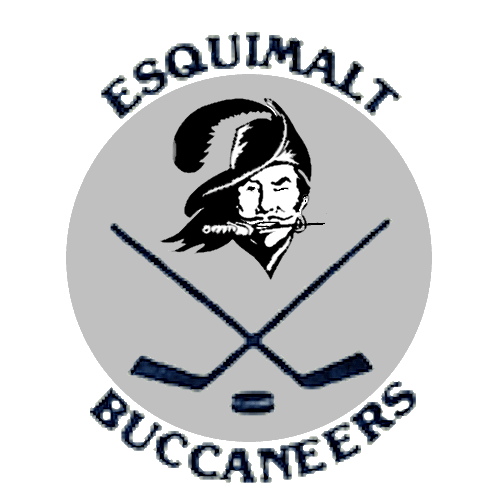
The Esquimalt Buccaneers made their debut in September 1982. The Nanaimo Clippers had to reloacte, as a WHL club(Nanaimo Islanders) was brought to the City, renaming them the Esquimalt Buccanners. The Buccaneers name stemmed from the City's annual Buccanneer Days. Mid-way thru the season Esquimalt returned to Nanaimo as the Clippers.
1988 sadly saw the end of one of the league's founding four franchises when the Summerland Buckaroos ceased operations. The team moved from Kelowna to Summerland in '83 before shutting things down five years later. Thankfully, the league has returned to Kelowna in several different forms since then, including the current-day West Kelowna Warriors.
Looking Back
January 1982, Abbotsford Flyers' Dave Moree sets a league record and performance that may never be surpassed. He scores the fastest 3 consecutive goals by the same player - scoring 3 in 24 seconds. What is more amazing is that he scored all 3 while his team was short-handed.
March 1984, Brett Hull of the Penticton Knights scores his 105th goal and his 188th point of the season establishing BCHL records that endure to this day.
June 1984, Brett Hull is drafted directly out of the BCHL in the 6th round by the Calgary Flames. Hull would go on to an NHL Hall of Fame career and be considered, as a player, the BCHL's most successful alum.
February 1985, Penticton sets a league record for most goals in one game by one team with 28. Penticton's 28 - 5 victory also sets a record for most goals in one game by both teams with 33.
November 4, 1985, Former BCHL player Tad Campbell (Kelowna Buckaroos and Vernon Vikings) wins a Juno Award as a singer/songwriter with his group 'Idle Eyes' for his ,85 hit single 'Tokyo Rose.' He and his group also swept the West Coast Music Awards in '86.
May 1986, The Penticton Knights under coach Rick Kozuback become the first team from the BCHL to win the national Junior 'A' Championship - the Centennial Cup.
February 1989, Both Greg Hadden and his team, the New Westminster Royals set league records for shorthanded goals. Hadden scores his 14th while the Royals as a team have a total of 46.
June 1989, Vernon Lakers defenceman Jason Marshall becomes the first player to be drafted directly from the BCHL in the first round - the ninth pick selected by St. Louis.
Source Material: 60th Anniversary Series PDF | SmartHockey 50th Anniversary Edition PDF | History of the Esquimalt Buccaneers
LEAGUE YEARS 1990'S
LEAGUE YEARS 1990'S
The 1990's

The British Columbia Junior Hockey League became known as the British Columbia Hockey League in 1996.
The League seemed to stabilize, some what, in the 1990's, after two decades of endless expansion, contraction and team relocation. The 90's saw four teams leave the league, seven were added and six relocated.
The League proved to be "a power to be reckoned with" at the regional level and especially at the national level in the 1990's. It received ten provincial titles, Mowat Cups, eight British Columbia versus Alberta titles, Doyle Cups, five Western Canadian titles, Abbott Cups and nine National Championship appearances which includes three Centennial Cups and three Royal Bank Cups (National Championship).
The Leagues third to eighth National titles were won by the Vernon Lakers, 1990 & 1991, Kelowna Spartans,1993, Vernon Vipers, 1996 & 1999 and the South Surrey Eagles in 1998.
The League also hosted the National Championship Tournament, for the first time, in 1990 by the Vernon Lakers and again in 1998 by the Naniamo Clippers.
The Next One
In 1990, a 16-year-old Vancouver-born player named Paul Kariya made his debut with the Penticton Panthers. From day one, it was clear that Kariya possessed an inordinate amount of talent and he was set on proving that every chance he got. As a rookie in the BCJHL as it was known at the time, he led his team in scoring and tied for sixth overall in the league with 112 points in 54 games.
It didn't take long for the rest of the hockey world notice there was a special talent plying his trade in the league. That year, Kariya got the invite to play for Team Canada at the Under-18s and led the country in points with 12 in five games at the tournament.
Pat Hodgins is sixth all time in BCHL scoring and was playing his fifth and final season in the league for the Victoria Warriors during Kariya's rookie campaign. He got the chance to play against him on numerous occasions that year and he recalls recognizing what a special player he was even at that young age. "He was head and shoulders the most talented kid in the league, without question." said Hodgins. "It was a pleasure to play against him. It was hard to play against him. He was that good."
"We played against each other in Victoria. During the game, he got his 100th point, so we faced off and I said congratulations and he said thanks. Later in the game, I got my 100th point and he said congratulations and I said "well thanks, but you're 16 and I'm 20."
With a year of junior hockey experience under his belt, Kariya enjoyed even more success in his second season in the league, finishing second in league scoring with 132 points 41 games. He once again got to show his skills on the international stage that year, representing Canada at the IIHF World Junior Championship as a 17-year-old.
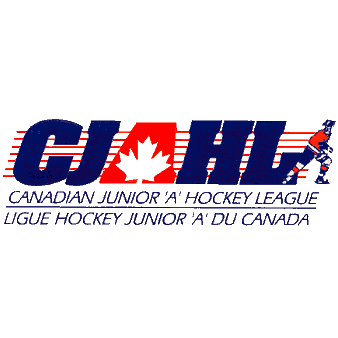
A Decade of Dominance
We finished off the '80s with back-to-back championships in Vernon and that theme carried all the way through the following decade. The Vernon Lakers made it four in five years by winning the 1991 and 1992 titles to cement their legacy as a true dynasty.
The team's head coach for three of those seasons was Ed Johstone, who also played for Vernon back in the early 1970s. He remembers a team that used its versatility to get the job done.
"We played you hard," said Johnstone. "We could play any way you wanted to play. If you wanted to skate and play a wide-open game, we could do that. If you wanted to bang and crash, we could do that as well." "If the players were told to do something and they didn't think it was right, they would ask questions. They took that to heart and we were successful."
Vernon changed its name to the Vipers to start the 1995-96 campaign, but they kept the winning tradition going, taking the league championship that same year as well as a fourth time in the decade in 1999. The Kelowna Spartans also enjoyed success in the early part of the '90s, winning the Fred Page Cup in back-to-back years in 1993 and 1994 before ultimately ceasing operations a year later.
Another powerhouse was brewing in the second half of the decade in South Surrey. The Eagles won their first championship in team history in 1997, led by the scoring prowess of Shane Kuss and future NHLer Scott Gomez. They would win a second title the following year and that team would eventually be inducted into the BC Hockey Hall of Fame over 20 years later.
Other champions in the decade include first-time winners the New Westminster Royals in 1990 and the Chilliwack Chiefs in 1995.
B.C. teams dominated on the national stage as well with six of 10 winners coming from the BCHL in the '90s. The Lakers won the Centennial Cup two years in a row to start the decade, then it was the Kelowna Spartans in '93, the Vipers in '96, the South Surrey Eagles in '98 and finally the Vipers again to close things out in '99.
This would prove to be the most successful era the league would enjoy at the National Championship tournament.
An All-Time Great
Although he never played in the NHL like many of the great BCHL players from the past, one of the best and most important players in league history is former South Surrey Eagle Shane Kuss. The diminutive forward shredded team defences for four years from 1993 to 1997 and, after registering three straight seasons of over 100 points, holds the league record for points in a career with 418 in 238 games, over 40 more than the next closest. A setup man at heart, he also holds the record for most assists in a career with 282.
Kuss is humble when discussing his accomplishments in the league and is always sure to credit his teammates and others around him at the time.
"The time I spent there, the people I played with, the memories I have, it all contributes to how I feel about that record," said Kuss. "It was a lot of fun going through that. I wouldn't have been able to accomplish a lot of those numbers without good teammates and good linemates. I was fortunate enough to have those people around me that I bonded with and was able to achieve those numbers."
Kuss' first 100-point year came in his sophomore season in the league when he collected 123 points. The next year, he notched 107, but his high-water mark came in 1996-97 when he put up 140 points on 50 goals and 90 assists to lead the league in scoring for the first time.
That final season would prove to be memorable in another way as the Eagles won their first championship in franchise history.
"The year before, we were up and down and building towards it," said Kuss. "To be able to finally win and experience what it feels like to win that championship and to share that with a group of people that you worked so hard with, you battled in practice and spent so much time with, that's what you want. That's the end prize."
"It was a great time in my life. Being able to build memories and bonds in those years, you'll never forget that."
A New Direction
In 1990, with climbing attendance numbers, increased media coverage and new corporate partnerships, the BCJHL introduced its first full-time league president in Ron Boileau. Under his guidance, the league experienced stability for the first time in its existence.
In the 1980s, there were 16 franchises that relocated, but in the 10 years after he took the job, there were only four.
Even with a new guiding hand and relative quiet when it came to relocation, there were still a number of significant teams added in the '90s that remain a huge part of today's league. The Victoria Salsa began play in 1994 and are known as the Grizzlies today. The Royal City Outlaws were also introduced that same year, and after a brief two-year stint, relocated to Prince George where the Spruce Kings Junior A chapter was born.1994 also welcomed the Langley Thunder franchise. The team stayed in Langley until 2006 when it moved to West Kelowna to become the Westside Warriors, known as the West Kelowna Warriors today. The Quesnel Millionaires came along in 1996 and stayed there until 2011 when they were reborn as the Chilliwack Chiefs. Finally, the Burnaby Bulldogs entered the league in 1998 and, after four years, moved to Port Alberni to become the Alberni Valley Bulldogs of today.

One more change during the decade was the name of the league itself. In 1996, the letter J was dropped from the acronym and the league became simply known as the BC Hockey League, or the BCHL. A name that has stuck for the past 26 years. Oh, and also the league got a new logo.
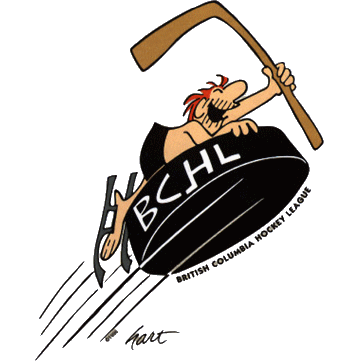
What was the deal with the caveman?
A puck.
A hockey stick.
A caveman.
As recognizable as it was unique, American comic strip artist Johnny Hart's character B.C. represented the BCHL as the official logo beginning in the mid 90s. Through a licensing agreement with Hart, the naive lead character in the comic strip B.C. found his way onto hockey jerseys, team merchandise, and almost everything BCHL during the 90's and into the new century.
While the logo was replaced during the BCHL's rebranding process in 2004, it remains as part of the league's colorful history and is a testament to the BCHL's willingness try something new and stand apart from other leagues.
It may have had nothing to do with hockey, but no one can argue the uniqueness during a time when simple lettering and shields were the norm.
It wasn't just the league who was sporting a more creative and cartoonish look - BCHL fans in the 90's saw many new logos on the front of BCHL jerseys. While teams like the Trail Smoke Eaters and Merritt Centennials maintained a connection to their original designs, some teams went in new direction.
The Prince George Spruce Kings introduced a cartoon spruce tree, complete with spinning saw blade to represent their local forest-driven economy. The Quesnel Millionaires had the cartoon Miner, a loose representation of the famed Billy Barker who made and lost his fortune during the Cariboo Gold Rush. And... who could forget the stick wielding, overly muscular Pepper of the Victoria Salsa or the big eyed, razor toothed Hornet of Langley?
While a quick scan of current BCHL logos show a distinct return to the traditional, the Caveman, the Angry Spruce Tree, and the myriad of other logos that hold their place in league history are all reminders of constant change and the evolution of the BCHL into what it is today.
Looking Back
February 9, 1990, The New Westminster Royals see their unbeaten streak of 38 consecutive games finally come to an end. This streak which lasted over 4 months.
March 1991, This season sees the conclusion of one of the most impressive player performances in league history. Paul Kariya of Penticton finishes 6th in league scoring, is named MVP, Rookie of the Year, the league's Most Sportsmanlike Player, Scholastic Player of the Year and League All Star.
Source Material: 60th Anniversary Series PDF | SmartHockey 50th Anniversary Edition PDF
LEAGUE YEARS 2000'S
LEAGUE YEARS 2000'S
The 2000's

The British Columbia Hockey League enjoyed another decade of relative stableization in the 2000's. There was very little expansion, contraction or team relocation. The 2000's saw no teams leave, although one took a two year leave of absence, three were added and four teams relocated.
The League maintained another decade of regional and national exposure in the 2000's. It recieved ten Mowat Cups - Provincial and four Doyle Cups - British Columbia versus Alberta. The League also had six Royal Bank Cup Tournament - National Championships, appearances, which includes two Royal Bank Cups (National Championship),2006 & 2009.
The League acquired its ninth and tenth National titles in the 2000's with the Burnaby Express in 2006 and the Vernon Vipers in 2009. With the Vernon Vipers win it was their third Royal Bank Cup, 1996 & 1999, and the franchises fifth National title. This would set a new Canadian record of five National titles for one franchise surpassing the Prince Albert Raiders who had four.
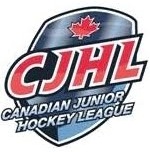
The League also hosted the National Championship Tournament, for the third time, in 2007 by Prince George Spruce Kings and again in 2009 by the Victoria Grizzlies.
In 2003, the league opened a League Office for the first time and a new leadership group came aboard to further the progress built over the past decade. Former Vancouver Canucks defenceman John Grisdale was named the BCHL's Commissioner while former Powell River Kings General Manager David Sales became the league's Executive Director. Under the stewardship of Grisdale and Sales, the league leapt into the 21st century by establishing a presence on the internet, expanding the league's business operations, and setting in motion the audio and video broadcasting that now brings BCHL into homes all over the country.
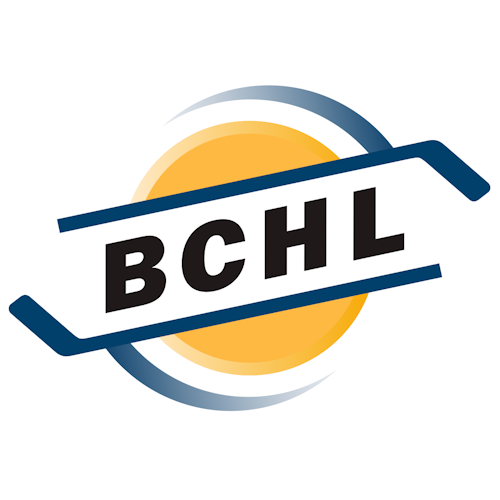
To the dismay of some and the delight of most, the league got rid of its caveman drawing logo in 2005 in favour of the current BCHL mark that exists today.
The league also enjoyed a series of fantastic seasons on the ice. While the Chilliwack Chiefs and Nanaimo Clippers dominated on the ice, each winning a pair of Fred Page Cup Championships, players from all over the league were catching the attention of National Hockey League and NCAA scouts. In 2006, Burnaby Express forward Kyle Turris announced his presence on the hockey world's radar with a dominant performance during his team's RBC Royal Bank Cup-winning season.
A Moment of Parity
In contrast to what we saw in previous decades, the 2000s did not feature one or two teams dominating when it comes to league championships. There were no dynasties in the decade, which indicated parity within the league was on the horizon. This point was driven home when there was a six-year span with six different champions, which was something uncommon in years past.
To start off the decade, the Chilliwack Chiefs won their first title since moving from Richmond in 1990. The year after that, it was the Victoria Salsa who captured their first Fred Page Cup in franchise history.
A key part of that championship Salsa team was Kyle Greentree who played five seasons with the Salsa from 1999 to 2004 and ended up as the league's third all-time leading goal scorer and point producer.
"We had a lot of older guys," recalled Greentree. "As we went through the playoffs, it was pretty tough. We played Nanaimo, Burnaby and Merritt. I remember a lot of Game 7s. The Game 7 at home in the finals was pretty crazy when we won it. I'm from Victoria, so friends and family were there. It was something that we all worked pretty hard towards."
The Chiefs won it again in 2002, then it was the Vernon Vipers, Nanaimo Clippers, Surrey Eagles and Burnaby Express, who won in just their fifth year of existence and their first after moving to Burnaby. In 2007, the Clippers won for the second time in four years and the year after, the Penticton Vees won their first title in 22 seasons.
The Vernon Vipers would win it all in 2009, which was a signal of things to come in the following decade.
Expanding Again
As mentioned previously, the BCHL welcomed the Coquitlam Express into the fold in 2001. The team played there for four seasons before relocating to Burnaby in 2005. After winning the Fred Page Cup in their first year in Burnaby, the team was destined to return to Coquitlam a few year later, returning in 2010 where they have remained ever since.
That same season saw the addition of another current-day franchise in the Salmon Arm Silverbacks. The BCHL had tried the Salmon Arm/Shuswap market in the past with the Totems/Blazers/Tigers franchise in the '80s, but this time they got it right with the Silverbacks who have been a league member ever since.
One other expansion team entered the fray during the decade. The Williams Lake TimberWolves began play in 2002, but their experience was short-lived. The team took a two-year hiatus from 2007 to 2009 before returning for one year and ultimately ceasing operations in 2010.
Several other teams relocated during the decade to become more familiar to current-day BCHL fans. The Chilliwack Chiefs moved to Langley to become the Langley Chiefs, who eventually turned into the Rivermen. That team replaced the Langley Hornets who moved to West Kelowna in 2006 to become the Westside Warriors and eventually the West Kelowna Warriors. The Burnaby Bulldogs, founded in 1998, moved to Port Alberni in 2002 to become the Alberni Valley Bulldogs.
Last, but not least, the Victoria Salsa ditched the muscular jalapeno pepper logo and rebranded as the Grizzlies in 2006.
A Broken Record
One significant league milestone was broken in the 2000s when Mike Di Stefano set the record for most games played with 297. Di Stefano played five seasons in the league from 2000 to 2004 and suited up for four different franchises, including the Burnaby Bulldogs, Quesnel Millionaires, Powell River Kings and Chilliwack Chiefs. He even returned to the Bulldogs for a period after they had moved to Port Alberni.
"It's quite a privilege to be able to say [I own the record]," said Di Stefano. "I think about the fun I had, the friendships I made. and the experiences I went through. It's a really cool thing to have. It's something that I'll be able to show my kids and talk to my friends about."
During the 2000s, the BCHL really established itself as a breeding ground for NHL teams to find talent. From 2000 to 2009, there were 59 players selected from BCHL teams at the NHL Draft, which is the most of any decade to date. The fact that there were nine rounds at the time helped these numbers, but in 2003 alone, there were 11 players taken and a year later, there were 10.
Although it did not quite match up with the numbers from 2003 and 2004, the '07 draft may well be the most significant of the decade. From 2005 to 2007, Kyle Turris established himself as a high-end NHL prospect after putting up 193 points in 110 regular-season games with the Burnaby Express, including his last year where he came second in league scoring with 121 points as a 17-year-old. He also helped lead the Express to a league an national title in 2006.
Turris would be selected third overall by the Phoenix Coyotes at the 2007 draft and became the highest-ever pick from the BCHL and the highest ever pick of a Junior A player, a mark that stands to this day. Turris remains an NHLer and is currently in his second season with the Edmonton Oilers.
That '07 draft featured another first-rounder from the BCHL in Riley Nash who also remains in the league and is currently a member of the Arizona Coyotes.
There was one more notable name that came from the same draft year, although he had to wait until the fifth round to hear his name called. Former Victoria Grizzlies forward Jamie Benn was selected by the Dallas Stars and became the most productive NHL player to come out of the league in the 2000s. Benn has played the entirety of his career in Dallas and is the 10th all-time leading scorer among BCHL alumni with 754 points and counting over a 13-year NHL career.
Source Material: 60th Anniversary Series PDF
LEAGUE YEARS 2010'S
LEAGUE YEARS 2010'S
The 2010's
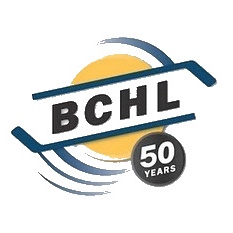
The British Columbia Hockey League began the 2010s with its representative, the Vernon Vipers, winning the Royal Bank Cup. It is the Leagues' eleventh, Vernons' sixth and the Vipers' fourth National Title.
2010-11 - League sees the loss of the Williams Lake Timberwolves, while the Burnaby Express relocate to become the Coquitlam Express. The Vernon Vipers enter their third consecutive trip to the National Tournament, falling 2-0 to Pembroke in the final.
2011-12 - League celebrate it's 50th Anniversary (1961-2011). 15-year-old affiliate player draft in October, two rounds. The Langley Chiefs adopt a new name the Langley Rivermen. The Quesnel Millionaires have been sold to play out of Chilliwack as the Chilliwack Chiefs. The Chiefs will play in the Interior Conference for 2011-12. They will revert to the Coastal Conference for the 2012 season. The Penticton Vees win the 2012 Royal Bank Cup, the leagues twelfth National Title.
42 Straight
The 2011-12 Penticton Vees were always going to be a good team, but nobody could have predicted the heights they would end up reaching. The team finished second in the Interior Conference the year before, just four points back of the eventual champion Vernon Vipers. The Vees won their first-round series with the Quesnel Millionaires that year, but were bounced by a solid Salmon Arm Silverbacks team in five games in the second round.
The Vees won their first-round series with the Quesnel Millionaires that year, but were bounced by a solid Salmon Arm Silvrbacks team in five games in the second round.The Vees got off to a great start in 2011-12, going 12-3-2 through their first 17 games. On Nov. 5, 2011, they dropped a 3-2 overtime decision to the Merritt Centennials. After that, the team reeled off 42 straight winsbefore their streak was halted on the final game of the regular season. The 42 consecutive victories not only set a BCHL record, but established the mark for the Canadian Junior Hockey League.
That season, Penticton boasted six of the league's top-nine leading scorers, including Joey Benik who finished second overall with 96 points in 60 games and future NHLer Mike Reilly who led all BCHL defencemen with 83 points.
In the playoffs, Penticton got by the Chilliwack Chiefs in six, the Merritt Centennials in five and beat the Powell River Kings in four straight to clinch the Fred Page Cup. They eventually capped off their magical season with a national championship after a 4-3 win over the Woodstock Slammers of the Maritime Junior Hockey League.
2012-13 - League reduced the games played from sizty to fifty-eight, fifty-six in the regular season & two "Showcase" games. Chilliwack Chiefs reasigned to the Coastal Conference. Realignment of the Conferences include the readdition of the Island & Mainland Divisions as well as a few teams changing Conferences/Divisions. Also, a "Showcase Series" (all sixteen teams play two games in one location, in one weekend) will take place with points awarded going towards the regular season standings. The Surrey Eagles earned a berth to the RBC Cup, loseing in the semifinal, by winning the inaugural Western Canada Cup.

2013-14 - BCHL went back to an Interior, Island & Mainland Divisions. This also meant that the playoff format was changed. The Vernon Vipers hosted the 2014 Royal Bank Cup with a semifinal lose to eventual National Champion, Yorkton Terriers (SJHL). The League Champion the Coquitlam Express failed to qualifiy bowing out, of the playoff run, in the Western Canada Cup
2014-15 - League champion, Penticton Vees, won the Western Canada Cup but, lost in the semifinal of the Royal Bank Cup.
2015-16 - The Wenatchee Wild of the USA entered the league to play in the Mainland Division for the season. The West Kelowna Warriors won the Fred Page Cup, Western Canada Cup and the Royal Bank Cup for the leagues 13th National Championship.
2016-17 - Season the playoff format was tweeked with the elimination of the Divisional round-robin started for the 2014 playoffs. This year the winner of the Island and Mainland Divisions play a series to determine who plays the Interior Champion. Penticton won the league Western Canada but, lost in the National semifinal.
2017-18 - Playoff format was re-adjusted to include a cross-over event of the lowest two seeds in the Island/Mainland to the Interior for the 2018 playoffs. The Wenatchee Wild, as League Champion, and Chilliwack Chiefs, as Host, play in the National Tournament. Chilliwack claims the leagues fourteenth national title. After fifteen years on the job, this was the final season(June 1) for John Grisdale as commissioner of the BCHL.
2018-19 - Chris Hebb became the new Commissioner, joined the BCHL in June 2018. Playoffs, top two of the three last-place teams, determined by regular-season points total, will go into the Interior Division for Round 1. The Island and/or Mainland team crossing over will be the No. 7 or No. 8 seed if they have a higher points total than the Interior last-place team.
2019-20 - BCHL season cancelled, after first round of playoffs, March 13, 202, due to recent concerns regarding the COVID-19 pandemic.
Setting a New Standard at the Draft
We've talked a lot about the BCHL's performance at the NHL Draft through the decades and how it peaked in quantity in the 2000s where there were the most players selected in any other decade.
But, if you're looking for quality over quantity, the 2010s might be the best stretch for the league. The 2016 draft in particular set a new standard for first-round picks as three BCHL players were chosen on the first day of the draft, the most in league history.
Penticton Vees forward Tyson Jost went 10th overall to the Colorado Avalanche, Vees defenceman Dante Fabbro was taken 17th by the Nashville Predators and Chilliwack Chiefs blueliner Dennis Cholowski was chosen 20th by the Detroit Red Wings.
Later on in the decade, the BCHL also experienced one of the better drafts in history, but what made it more special was the fact it was hosted in Vancouver, allowing many of the league's prospects to attend in person. The 2019 NHL Entry Draft saw eight BCHL players selected, an additional four that would go on to play in the league the following year and two others that had previously played in the BCHL. The highest pick that year was Victoria Grizzlies forward Alex Newhook, fresh off lighting the league up for 100 points. He was taken 16th overall by Colorado and is currently a regular in their lineup, just two years after being drafted.
"It was a pretty crazy day," said Newhook. "It's something you dream of your whole life. To have that kind of support there with my family and my friends from Victoria, it was everything I dreamed of and more."
Source Material: 60th Anniversary Series PDF
LEAGUE YEARS 2020'S
LEAGUE YEARS 2020'S
The 2020's

The British Columbia Hockey League began the 2020s in the midst of the global Covid-19 Pandemic. The league stuggled to ice a season for 2020-21. After many attempts to configure a schedule, to please all parties, it was eventually scaled down to an abbreviated one. It involved extending the 'Training Season' and shortening the regular season to 20 games of 'Pod Play' with 3 to 4 teams per pod.
2020-21
The Cranbrook Bucks become the league's 18th team.
An extended exhibition season took place from September to November. Cohorts of 4 teams played in 4 different regions which were the Island, Mainland, Kootenay and Okanagan. A 20 game Pod Season(Regular Season) was established where pods consist of 3-4 teams. Pod citys were Port Alberni, Coquitlam, Chilliwack, Penticton & Vernon.

Langley Rivermen & Wenatchee Wild opt out of Pod Season due to covid-9 pandemic related issues.
The Canadian Junior Hockey League (CJHL) announced, April 9 2021, that the British Columbia Hockey League (BCHL) has submitted a notice to withdraw their membership from the CJHL, effective March 24th.
Reasons why the BCHL left the CJHL Modernizing-Junior-Hockey-in-Canada.pdf.
2021 saw yet another standout performance at the NHL Draft as well. Former Trail Smoke Eaters forward Kent Johnson was drafted fifth overall by the Columbus Blue Jackets after playing his freshman season at the University of Michigan. Johnson won the league MVP in his final year in the BCHL and also eclipsed the 100- point mark as the league's top scorer.
2021-22 (60th ANNIVERSARY)
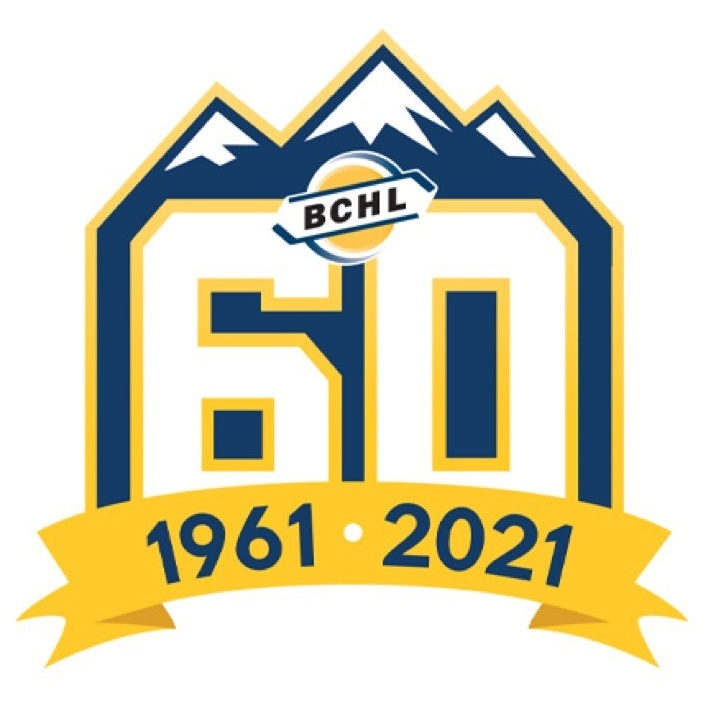
Players and staff traveling across the border will follow all COVID-19 guidelines, including providing a negative test before crossing into the U.S. and before returning to Canada.
BCHL regular-season standings will be determined by point percentage rather than total points.
Due to ongoing floods, road closures and the approaching winter weather, the BCHL will remove all out-of-conference games for part of the 2021-22 season.
Penticton and Nanaimo meet in the Fred Page Cup. Penticton won the series in four straight games to secure their thirteenth.
Note: On Friday, April 9, 2021, the British Columbia Hockey League (BCHL) announced it had withdrawn its membership from the Canadian Junior Hockey League (CJHL) so, the BCHL league champions no longer take part in the National Jr. A, Centennial Cup, presented by Tim Hortons, playdowns.
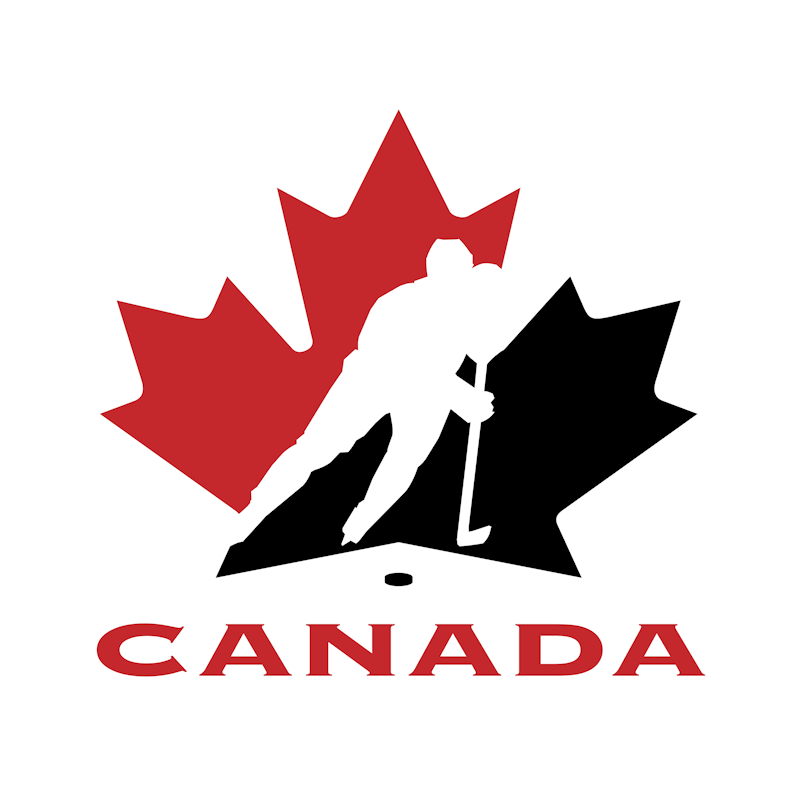
2022-23
The BCHL's Board of Governors has voted to not renew the league's agreement with Hockey Canada, meaning its 18 franchises will operate outside Hockey Canada's system (non-sanctioned league) as of June 1, 2023. Read all about it HERE. Meaning henceforth it will operate as an independent league.
Penticton won it's record setting fourteenth league title defeating Alberni Valley in the Fred Page Cup series in four straight games.
2023-24
The British Columbia Hockey League (BCHL) acknowledged today that the ownership group of the Wenatchee Wild has successfully acquired the Winnipeg Ice of the Western Hockey League (WHL) and will be moving the team to Wenatchee for next season. This will mean the BCHL's Wild franchise will no longer play in Wenatchee.
February 1 - The BC Hockey League (BCHL) has announced that five Alberta-based teams have signed franchise agreements and are now officially members of the league, as of January 31. Blackfalds Bulldogs, Brooks Bandits, Okotoks Oilers, Sherwood Park Crusaders and Spruce Grove Saints The "Official" press release is HERE
March 31, 2024 - Merritt Centennials Board of Directors have made thedecision to cease operations at the end of this season and withdraw from the BCHL. Citing increased expenses, covid-19 pandemic, the floods of 2021, lower than expected attendance and higer costs of player development and recruiting.
2024-25
The 11-team Vancouver Island Junior Hockey League declared Monday, April 29'24, that it was leaving Hockey Canada starting next fall and becoming an independent league. The league has since announced that they will become a feeder league for the BCHL.
An NCAA rule change, November '24, allowing CHL players has had a ripple effect. Many players in the BCHL with scholarships have jumped back to the CHL. This created a shortage of players for some team of the BCHL. Many players then moved to the BCHL from else where on many occasions for some BCHL teams.
The BCHL acknowledged, March 24, that ownership of the Penticton Vees has acquired a Western Hockey League (WHL) expansion team, beginning in the 2025-26 season, and the City of Chilliwack has been identified as a WHL expansion location for 2026-27. Vees ownership will retain its membership in the BCHL and will look to relocate in the near future, while the Chiefs organization, who had no involvement in the city's WHL expansion process, remains committed to the BCHL and has already formally indicated they will play in the league in 2025-26, expressing their commitment beyond that as well.
2025-26
The league approved a formal affiliation and development agreement with the Junior Prospects Hockey League (JPHL) that will facilitate player movement between the two leagues more freely, in order to provide eligible athletes with more opportunities for development and injury rehabilitation.
March 24 - that ownership of the Penticton Vees has acquired a Western Hockey League (WHL) expansion team, beginning in the 2025-26 season, and the City of Chilliwack has been identified as a WHL expansion location for 2026-27. Vees ownership will retain its membership in the BCHL and will look to relocate in the near future, while the Chiefs organization, who had no involvement in the city's WHL expansion process, remains committed to the BCHL and has already formally indicated they will play in the league in 2025-26, expressing their commitment beyond that as well.
Formerly the Chief Executive Officer and Commissioner before that, Chris Hebb has shifted his role to Chief Strategic Officer, focusing on bigger picture league items as well as sponsorship.
Board of Governors has reached an agreement with Commissioner Steven Cocker on a three-year contract extension, at the end of the 2025-26 season, which is when the extension will kick in.
LEAGUE HIGHLIGHTS
LEAGUE HIGHLIGHTS
LEAGUE HIGHLIGHTS
Since the Leagues inception, in 1961 to the present, the OMJHL, OJHL, BCJHL and BCHL amassed many awards, cups and championships, which includes the list below....
- 48 - Mowat Cup - BC Championship
- 1962 1964 1968 1969 1970 1971 1972 1973 1974 1975 1978 1980 1981 1982 1983 1984 1985 1986 1987 1988 1989 1990 1991 1992 1993 1994 1995 1996 1997 1998 1999
- Automatic Winners: 2000 2001 2002 2003 2004 2005 2006 2007 2008 2009 2010 2011 2012 2013 2014 2015 2016
Note: Mowat Cup was retired after 2016 - Runners-up: 1963 1965 1966 1967 1976 1977 1979
- BCHockey Recognition:
2017
2018 2019 2022 2023
Note: No Competition in 2020 & 2021 - 28 - Doyle Cup / British Columbia vs Alberta Championship
- 1968 1970 1973 1974 1978 1983 1984 1985 1986 1987 1989 1990 1991 1992 1993 1996 1997 1998 1999 2002 2004 2006 2009 2010 2011 2012 2018 2019
- Runners-up: 1962 1964 1969 1971 1972 1975 1976 1980 1981 1982 1988 1994 1995 2000 2001 2003 2005 2007 2008
Note: Doyle Cup was retired after 2012, in favor of the Western Canada Cup (2013-17), then reinstated for the 2018 - 10 - Abbott Cup - Western Canadian Championship (BC/AB vs SK/MB)
- 1983 1985 1986 1987 1989 1991 1993 1997 1998 1999
- Runners-up: 1968 1970 1973 1974 1978 1984 1992 1996
Note: Abbott Cup was retired after 1999 - 3 - Western Canada Cup - (Western Canadian Championship, BC-AB-SK-MB)
- 2013 2015 2016
- Runners-up:2017
Note: Western Canada Cup was retired after 2017 and the Doyle Cup was reinstated for 2018. - 14 - Centennial Cup, RBC Cup, National Jr A - National Championships
- 1986 1987 1990 1991 1993 1996 1998 1999 2006 2009 2010 2012 2016 2018
- Runners-up:1983
1985
1990
1994
1997
2007
2011
2019
Bronze Medalist: 2000
Semi-Finalist: 1992 2002 2009 2013 2014 2015 2017 2018
Appearances: 1989 2004
Hosts: 1990 1998 2007 2009 2014 2018
LEAGUE OVERVIEW
LEAGUE OVERVIEW
BRITISH COLUMBIA HOCKEY LEAGUE SEASONS
The British Columbia Hockey League(since 1996), as the League is know today, has gone by different names in past, they being...
- Okanagan-Mainline Junior 'A' Hockey League - 1961-1963
- Okanagan Junior 'A' Hockey League - 1963-1967
- British Columbia Junior Hockey League - 1967-1996
- Note: 'A' » Amateur
League Independence
On March 24, 2021 the BCHL choose to opt-out of the CJHL. This resulted in them becoming non-eligible for futher national playdowns ie: Doyle Cup & Royal Bank Cup.
On June 1, 2023 the BCHL became an independent league. This, as a result of the league not re-newing it's agreement with Hockey Canada.
Pre-League Independence
The BCHL Champions were eligible for the right to play for the Royal Bank Cup via a regional playdown called the Doyle Cup.
In the past the BCHL played the champions of the following, now defunct, leagues. They are added here because some of the teams from these leagues ended up in the BCHL.
- Pacific Coast Junior Hockey League (Pac "A")
- Peace Cariboo Junior Hockey League (P-CJHL)
- Rocky Mountain Junior Hockey League (RMJHL)
....for the Mowat Cup (British Columbia Junior A Champions). The Mowat Cup winners would go on to play for the Doyle Cup (British Columbia vs Alberta). Then the Doyle Cup winners would play for the now retired Abbott Cup (Western Canadian Championship versus the Saskachewan/Manitoba champions). The Abbott Cup winners would then play for the Memorial Cup (1961-1970) and the Centennial Cup(1971-1995) and then the Royal Bank Cup(1996-2019).
